Text
4 notes
·
View notes
Text
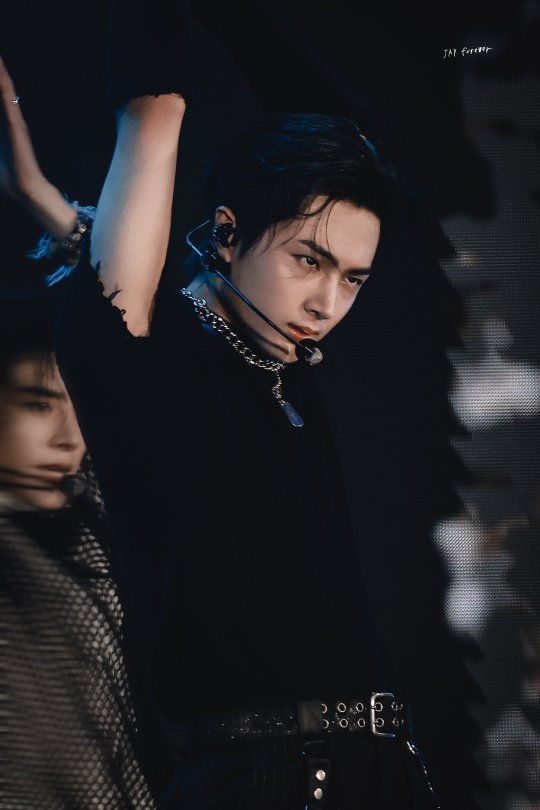
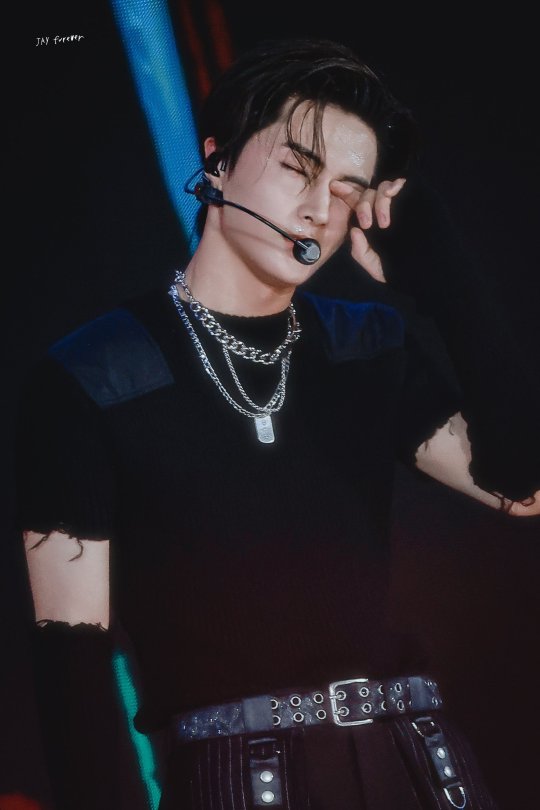

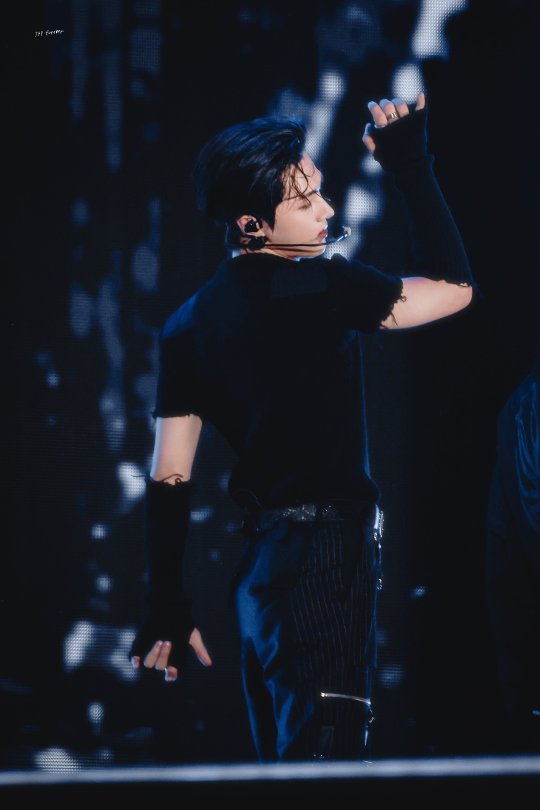
© 4ever
#missed so much content to post#but i'm too lazy to backtrack#so here's the latest fansite pics of jay#from yesterday's event in taiwan#nanareblogs#jay jay jay#can't tag him jayhaerys anymore sobs
35 notes
·
View notes
Note
hi !!! i dont remember if i sent an ask already, but i was wondering if you could pls pls change my @ from @bucketofhiros to @kiokantalope on your taglist 🥹🫶🏾 i love ur work so much and i do NAWT wanna miss anything 🙏🏾🙏🏾
noted!! I'll tag your new @ whenever I post something new. thank you for telling me 🥰💕
2 notes
·
View notes
Text
this is the type of content i am here for

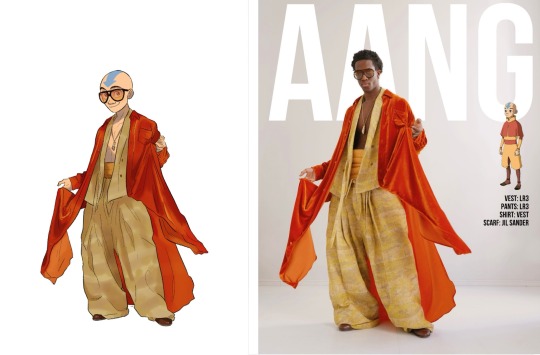
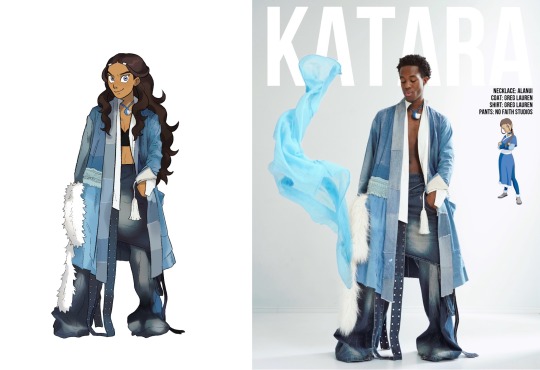
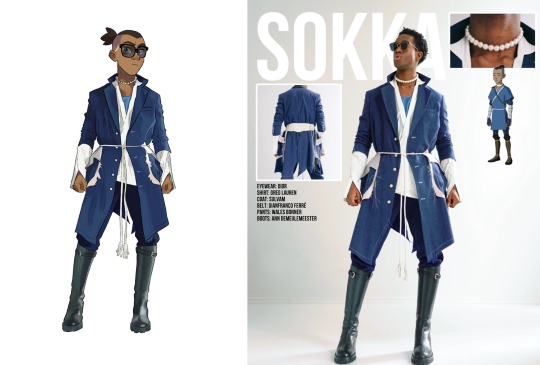

The Avatar the Last Airbender characters in high fashion styled by Wisdom Kaye looked so cool I had to draw them T-T
4K notes
·
View notes
Text
I hope the natla haters read this lol
Ok, here's my breakdown of Jessie Gender's video on NATLA. I decided not to post this as a comment on the video because I just don't feel like it would be productive, but I needed to refute the points she was making as she's a quite respected (at least, I really respect her opinions on things) video essayist and I felt like this video was...wild.
So, I guess it's best to just watch along with her video and read my commentary side-by-side because I don't give much context for my points, this is just a stream-of-consciousness style response.
To be perfectly clear - this is not intended to be a 'hate post' about her, this is just me feeling very strongly that the interpretations of things she had in her video needed to be talked about and another perspective given.
I shift from saying 'you' to 'Jessie' like halfway through (when I decided not to post this as a comment) but I don't feel like going through and changing all those, so yeah, just ignore it.
1) you insulted a martial arts kata as 'a mildly choreographed dance' - it shows a complete lack of understanding of other cultures and a desire to take a quick dig at something you didn't like in a way that insults a cultural practice. I really didn't expect to hear that sort of comment from you so it was pretty jarring when you said it. Ironically, you say that Sokka was wrong to assume the Kyoshi warrior's kata was a 'dance' because that's 'a girl's place' when...you literally made the same insult with not a hint of recognition just a few minutes earlier about a movie you didn't like…
2) I felt that the live-action really deepened a lot of the themes from the OG - take Iroh's storyline for example, fleshing out Suki's character so she's...you know, her own character and not just there to teach Sokka a lesson, and delving into how hard of decisions you have to make during a century long war. Idk, I'm just really curious as to how you felt quite literally the polar opposite of me
3) Sokka's sexism: the animated show handled it one way, but Sokka's treating women as 'less than' wasn't a core part of his character - in all honesty, it doesn't actually make any sense as he was raised by Hakoda (who we never see being sexist), Gran Gran (who left the NWT due to its sexism), and was surrounded mostly by older women. The sexism storyline in the cartoon was to teach a very blatant lesson to kids "don't be sexist, boys!" while the live-action made Sokka's struggles much more realistic and in line with the world building: he struggled with non-traditional masculinity and if he was 'allowed' to be that way while they were at war. For me, it's a much more important message for young men today than the very dated 'women can fight, too!' message that was needed in the early 2000s. It's very odd to me how you claim that Sokka always taking charge isn't ever challenged when...in literally the scene you're showing when you say that, Katara challenges him.
4) I'm sorry, but I cannot possibly see how Suki is her own person more in the animated version than in the live-action. She was literally created solely to teach Sokka a lesson and have no character traits other than 'I'm a strong woman warrior' where 'woman' means 'I like romance' rather than...I'm a whole person with my own wants and desires and fears that have nothing to do with a love interest as is shown in the live-action. You keep comparing the animated and live action as though they were trying to tell the same story about Sokka's journey with his role in the world, but they weren't. Of course Suki's attitude toward him is going to be different, of course he's not going to need to tell her 'you're right, I'm a dumb, terrible man, pretty please could you teach me', because it's a different dynamic they're going for in the live-action.
5) When Sokka pinned her in their lesson in the live-action idk how you got that she was 'demuring herself' to Sokka? Just as in the cartoon, he managed to get the upper hand - which she promptly took back, teaching a lesson along the way. She didn't make herself less so Sokka could feel secure in his masculinity - it's a bit odd you feel that showing respect to someone and helping them learn is 'demuring yourself'. I much prefer them respecting each other than the animated version of them seeing each other as less than and then...her giving him a kiss to prove 'see, I'm a romance-loving girl, too'.
5) To me, Suki beating Sokka in the live-action when the first sparred wasn't her being mean, it was her not understanding how much less experience Sokka had fighting - she genuinely thought he would be able to hold his own against her because he had told her he was the best warrior in his tribe. Her face clearly shows 'I have no idea what I did wrong - I thought that type of sparring is what everyone did for fun, why was he uncomfortable with it?' Not really sure why you made the connection that us seeing Sokka's abs was meant to indicate that his insecurities are unfounded when...literally the whole season shows us that Sokka's struggles aren't "end goal = big strong warrior" but rather "you don't have to be a big strong warrior to help, you are allowed to delve into other aspects of who you are and those are just as important". Just because he has muscles, also doesn't mean he's a competent fighter - those two things aren't the same.
6) It feels like you took certain scenes and made wildly left-field interpretations of them and then claimed that that's what the show was intending you to take from it. It's like saying that the scene that cuts from Sokka saying he bets Momo tastes like chicken and cutting to the scene that shows people cooking meat actually means the showrunners are saying Sokka is going to cook and eat Momo this season and that will then give him the powers of the Avatar. It's very clearly not what the showrunners were saying, but if you interpret it in the least forgiving way and then make a wild leap off that, then yeah, you might get upset with that made-up interpretation. Same with the reasons they didn't put Sokka in the Kyoshi outfit - there is 0 evidence of them nixing that part due to transphobia. I didn't see it as any malicious intent, just a streamline of the plot so Sokka doesn't have to go change before running away on Appa.
7) I feel that the live-action DOES challenge the Fire Bender's colonialist rhetoric in the Kyoshi Island episode, but the animated...doesn't? At all? It's solely about girl power - and as we see with Azula and all the women fire nation soldiers, the fire nation doesn't seem too caught up in sexism. You know what they are caught up in? Which you mention? Bender supremacy. And that's what the live-action directly addresses with Sokka being so surprised that Suki is able to hold her own so well even though she isn't a bender. He's seen just how powerful benders are (they destroyed his home, killed his mom, and beat his ass last episode) and it's in line with the worldbuilding that he feels like he's already several steps behind in being a good enough warrior because he doesn't have bending (a storyline that isn't brought up until an episode in season 3 of the animated show). To me, the live-action Kyoshi storyline refutes the Fire Nation's imperialistic themes much better than the animated show does.
8) The live-action's lesson wasn't that might makes right - Suki never did any strength training exercises with Sokka, she taught him how to control his body and use his opponent's strength against them. Fight smarter, not harder. Know what you're fighting for, not just that you want to fight. Even if you don't have the resources of your opponent, it doesn't mean you're doomed from the start. That last one is particularly poignant when we look at how much stronger the Fire Nation is than the other nations they're subjugating: it's the classic 'oppressed rising up against their oppressors and not winning because they just punched harder, but because they used what they had to fight for a righteous cause and didn't just give up because the other side was more powerful'. That's quite directly what the live-action was saying - the exact lesson you thought it should be saying. You have to do some serious extrapolating from the animated episode to get to those themes while the live-action drew that concept up to the forefront immediately.
9) Aang's journey to accept his Avatar responsibility and the previous Avatar's enforcing this is directly from the animated series. Like, directly. It's not the live-action show saying 'colonialism good'. Showing the Avatar power wasn't the showrunners saying 'see, this OP is good and cool', it was to show the magnitude of it - something the animated show does too. The live-action does talk about how terrifying and damaging that power is - literally the previous episode has Aang almost toss Katara and Sokka off the mountain and they mention it. Just earlier in that episode, Sokka talks about Aang almost killing them and Aangs major hang up about embracing it is that he might hurt someone. Kyoshi argues that not learning to control it will hurt more people and - y'all, individuals are allowed to have their own views of the power that everyone doesn't have to agree with. What happened to 'make strong characters with flaws in their world view?' did you all of a sudden decide that's NOT actually good writing? So having the Avatar who used her powers liberally, and as the video states, used them maybe too much, telling Aang that he needs to use his own powers a lot is…consistent characterization? Which is then challenged by Roku later as he tells Aang that all the Avatars are different and have different views on the power of the Avatar. Why is Kyoshi's opinions suddenly taken as wholly accurate in representing what the show overall is trying to say? She's giving her opinion to Aang - an opinion that has some truth to it, but also some flaws that Aang will need to navigate on his own journey. Kyoshi and Roku's stories are not compressed all into Kyoshi - only the aspect of Roku taking control of Aang and using his body to fuck shit up in the Avatar state is compressed - not the ideological aspects of it
10) Sokka supporting Katara's fight against Pakku is a culmination of his arc to let go of obsessively protecting her and actually letting her decide her course of action herself - because his arc was different in the show than in the animated series. Trying to say that the reason he told her to kick Pakku's ass didn't fit because he was never sexist wasn't the reason - it WAS a culmination of his arc, you just refused to see it by clinging to the old one.
11) The whole argument as to 'why show genocide' I already made a post about, but to condemn the depiction based on the way you interpret the showrunner's quote is disingenuous. Again, it's taking something and making up a narrative around it so you can feel justified in hating it. It's important to show a culture before they are killed because they deserve to be seen as people, not just martyrs. They had lives. They lived and were happy and had a rich culture. They were not just 'fated to die and be told of in history books'. Genocide is disgusting and hard to watch - it's calculated and brutal. Showing that drives home just how awful the actions of the fire nation are in practice rather than just theory. Yes, the airbenders fighting was 'cool' to see - in the way that all action is 'cool' to see. But no, the genocide wasn't played as 'look at neat fighting!' in the live-action. It was shown as brutal and terrible, horrifying and surprising, and the airbenders didn't deserve what happened to them. It also gives you a direct view of what the fire nation is capable of when they come to the south pole and the northern water tribe: you've SEEN the devastation first hand and you DON'T want to see it again. The threat isn't theoretical, it's very real.
11.5) To take a CHILD'S quote about the sequence being 'so cool' is absolutely WILD to me. GORDON IS A CHILD! No, he's not going to have the most sophisticated and politically nuanced sound bite to say about the action sequence in an interview. HE'S A CHILD! Holy mother of god. To use that to bolster your point that 'that's the way it was intended to be viewed and how everyone is going to view it!' is just…..holy shit. You're taking media interpretation from A CHILD??????? Do you think, if we interviewed a child about the OG show, they'd talk about the fucking colonialism??? How Azula was abused too and didn't deserve her fate?? Or do you think they'd say "The fight between the Fire Lord and Aang at the end was so cool!" Honestly thought Jessie Gender wouldn't try to bolster her interpretation with a quote from A CHILD, but I guess here we are…
12) It's wild that she makes the point that conservatives are incapable of reading deeper than just the surface-level visuals of a story while…she's doing literally the same thing just in the opposite way. The live-action depicted the genocide, therefore they MUST just want to 'cool' visual of firebenders fighting airbenders! There can't be any other things at play here! No story being told whatsoever because all it is is spectacle! That's all I see! Ironically, she's falling into the same trap of not looking deeper at why one might depict the horrors of genocide and the battle against people with no army.
13) Aang actually treats the genocide as more immediate in the live-action than he does the animated show. Most animated episodes, you can forget that it even happened, while in the animated show, it pops up a lot in some unexpected ways like when he's uncomfortable waterbending because Gyatzo had always been his teacher, when he yells at Bumi for making light of the genocide, his desire to get to the north to keep it from happening again, when Zhao proclaims that he can wipe out an entire race of benders and Aang says he knows exactly what that's like, when he constantly stays to help people because 'I couldn’t help my own people, but I can help them'. Not only through Aang, but also through every child in the series - like with the animated show, the live-action shows how kids are shaped by the generational trauma of the war plus the immediate effects of it: Teo ready to fight, Jet making compromises to fight back, Sokka shouldering too much responsibility so young, Katara's trauma around her mother's death and her waterbending, Bumi losing his faith, Zuko and Azula being shaped by their father to be the perfect weapons to continue the war.
14) Interpreting Zuko's comment of 'sometimes the weak can become strong' right after his father mutilated him for showing compassion is not meant to be taken as a thesis that 'Zuko just needs to get better at fighting, this is what the story is saying, I am very smart'. It's showing HIS CURRENT view of the world - the idea that his father has taught him that he needs to be strong and Zuko has bought that and wants desperately to earn his father's love. Zuko's story through the series is showing that 'strength' isn't what his father defines it as (or what Jessie defines it as in her video) but rather it's strength of character - compassion is not weakness, it's strength, and no, that doesn't mean if you have compassion you punch harder.
15) The live-action show makes the Fire Nation MUCH more nuanced than the animated show - we see how Ozai and Azula aren't just maniacal villains, but we see the pain and torment their upbringings deal out to them, and in turn, deal to others. It shows the cycle much more clearly and showing fire nation citizens who disagree fleshes out the culture even more.
16) Jet was much more nuanced in the live-action as he's RIGHT about the mechanist being a spy and the king being lax in his duties. He's created a community of people to try to heal from the harm the fire nation has caused them and he gives actual good advice to Katara, helping her emotionally heal and remember the good aspects of her mother.
17) The argument that 'the live action is trying to ignore the past' is a massively simplified narrative. The live-action is showing Aang stuck in the past, unable to take large steps into the future. Pain, trauma and loss can anchor us in the past - it's HEALTHY to keep moving forward rather than only thinking about the pain in the past (ie Jet's advice to Katara). Aang was continually trying to avoid the genocide happening again while simultaneously trying to get past Avatars to do the big hard work for him. His lesson is not to 'forget the past just live in the now' but rather, don't let fear of what has happened in the past stop you from making a difference in the future. Yes, war is loss and suffering, but if you get paralyzed by not being able to prevent that, the fire nation will just keep marching across the world. It's about not letting the past immobilize you to the point where you stop fighting back against oppression - or getting together with a community to help you fight for fear they'll die just like those in the past did.
17.5) Letting go of the past is a buddhist philosophy that is a lot more complicated than Jessie is making it out to be here. Just as in the animated series, characters can come to realizations about lessons they need to learn while still taking seasons to fully learn the lesson - just because Aang said he's ready to let go of the past doesn't mean he's now ignoring it and all will be smooth sailing. It means he's ready to start taking steps to do that and approach life in a healthier way. It's wild that Jessie took the direct quote "I need to let go of the past to focus on my future" and then states that the show is saying "the character's aren't seeing future possibilities and hope, they're focused on the now" when, quite literally, the quote she just referenced….is talking about building a better future.
18) Then, she references later seasons (Aang in the fire nation school) a lot to indicate that the live-action is ignoring those concepts from the OG when….we're talking about season 1 here - not season 3. Why is the world not allowed to organically grow? Why would you make the argument that 'season 1 didn’t explicitly deal with these concepts that aren't brought up until season 3, so therefore they are ignoring them'?
19) Jessie uses a lot of clips from a Daily Wire (conservative talkshow) guy as if that has anything at all to do with the live-action ATLA. She's trying to draw a line between that ideology and the ideology of the show and I feel like she had to bastardize the NATLA show in order to do that so horribly, her interpretation of the story and themes is completely unrecognizable to what is actually shown on screen.
I usually agree with her takes on media, but this video was not it. Every interpretation she had, I interpreted the scenes/lessons in the exact opposite way and, I believe, I interpreted it closer to what the showrunners intended.
Oh no, i just had a thought: this is The Last Jedi all over again! I saw so many negative interpretations of that movie that I just sat and scratched my head over like "How in the WORLD did you get to that conclusion??" when I thought my own interpretation was just...the obvious way to view the movie. I had no idea my views on it would be so controversial. Here we are again. Time is a flat circle. Life is a meaningless cycle of disappointment and confusion, neverending.
#amazed you took the time to write all of that#RESPECT#nana talks series#natla#atla#atla live action
47 notes
·
View notes
Note
HOLD ONNNN is Carmessi 11.5 a new update?? Im so sorry but i was so inactive with tumblr lately cause i was too lazy and didn't had the gut to open it and now u js suddenly popped up from my tl and i remembered you existed with carmessi😭😭 please forgive me nana🙏🏻🙏🏻but istg is 11.5 and new update or not? Cause i srsly forgot everything now😔
I haven't updated carmesi in ages lmao so definitely not new... the latest episode is part 12!
1 note
·
View note
Text
omg i wanna do this
questions I think would be fun to be asked
what are 3 things you’d say shaped you into who you are?
show us a picture of your handwriting?
3 films you could watch for the rest of your life and not get bored of?
what’s an inside joke you have with your family or friends?
what made you start your blog?
what’s the best and worst part of being online/a creator?
what scares you the most and why?
any reacquiring dreams?
tell a story about your childhood
would you say you’re an emotional person?
what do you consider to be romance?
what’s some good advice you want to share?
what are you doing right now?
what’s something you’ve always wanted to do but maybe been to scared to do?
what do you think of when you hear the word “home”?
if you could change one thing about yourself, what would it be?
name 3 things that make you happy
do you believe in ghosts and/or aliens?
favourite thing about the day?
favourite things about the night?
are you a spiritual person?
say 3 things about someone you love
say 3 things about someone you hate
what’s one thing you’re proud of yourself for?
fave season and why?
fave colour and why?
any nicknames?
do you collect anything?
what do you do when you’re sad?
what’s one thing that never fails to make you happy/happier?
are you messy or organised?
how many tabs do you have open right now?
any hobbies?
any pet peeves?
do you trust easily?
are you an open book or do you have walls up?
share a secret
fave song at the moment?
youtuber you’ve been obsessed with and why?
any bad habits?
(this post was stolen from @teenage-mutant-ninja-freak, since it couldn't be reblogged anymore)
15K notes
·
View notes
Text
THISSSS POST THIS!!! I HAVE BEEN SCREAMING ABOUT THIS
SPOILERS for Episode 6 of the Avatar Live Action series
AKA why this episode makes me SO grateful for this adaptation (re: the Zuko flashbacks and the Agni Kai).
----
Wow.
I admit, I was really worried at the idea that Zuko might potentially fight back in the Agni Kai against his father in the live action. I expected to HATE it, and it's certainly a bold change, but it fits in SO WELL with why Zuko is the way that he is (and why he works so hard to push down his empathy whenever Aang tries to reason with him).
The Agni Kai - Zuko obviously did NOT want to fight his father. He still tried to apologize and beg for mercy, but in the end he was just too terrified of his father to disobey a direct order.

But when Ozai left him an opening to see what he'd do with it, Zuko couldn't bring himself to actually land a blow that might burn him. Making his lack of ruthlessness the weakness that Ozai ends up mutilating him for - even straight up telling Zuko that compassion is weakness and then demonstrating by holding his own child down and lighting him on fire - adds a layer of depth that only enhances the original scene (and in another stroke of genius, we see Ozai nearly in tears himself. He's convincing himself of this lesson as well as Zuko, which was likely passed down to him by his own father). Honestly, this to me is even more heartbreaking than Ozai burning him for refusing to stand and fight. Zuko did everything his father asked and he still failed, because his family has distorted what it means to be honorable and believes Zuko's capacity for mercy to be a shameful weakness unbecoming of an heir to the throne.
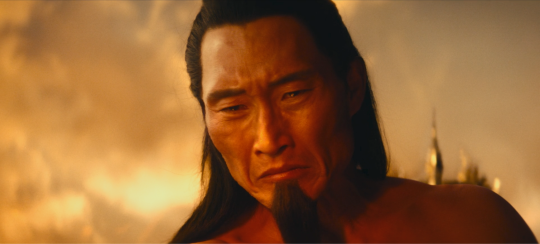
The 41st Division - And here come the waterworks. Assigning the very people Zuko was hurt so severely for trying to save to his ship as it's being cast out of the fire nation (presumably forever, with the Avatar not having been seen in 100 years) is SUCH a brilliant addition. His crew resents Zuko for being stuck on this impossible mission with this bratty, angry child. And Zuko is too ashamed of his "weakness" to explain why they were assigned to him.
I can totally see Zuko's hurt at their lack of respect making him even more angry (especially after everything he went through to save them from being sacrificed), and his seemingly irrational anger at them just continuing to make them resent him more in a neverending feedback loop of anger and disrespect that's been growing and festering for 3 years.
Which makes the scene at the end when Zuko's crew finally learns about how he saved their lives (as well as why he's obsessed with the avatar, why he's banished, what his scar means and why he's trying so very hard to rid himself of empathy, even if he can never quite manage it when it counts) so much more impactful. I SOBBED when the 41st Division stood at attention and showed him their utmost respect and loyalty, possibly for the first time since they've been on that ship. Zuko's soft "what's going on?" at finally being honored by his crew is just imprinted on my brain.
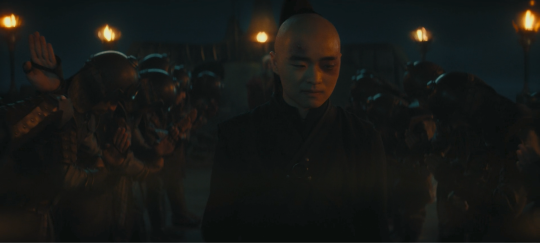
The seed of the idea that his compassion may NOT actually be what was shameful about his banishment afterall can finally begin to take root.
I just, damn, I love this episode so much.
#people are so quick to be like#oh zuko doesn't fight back? then i won't watch it#WATCH THE WHOLE DAMN THING DAMMIT#i got literal CHILLS when ozai said#since you care about the 41st division so much#take them as your crew#WHAT#THAT WAS NOT IN THE ANIMATED SERIES AT ALL#IT MADE THE SCENE EVEN BETTER#I LOVED IT#nana talks series#natla#atla#atla live action#zuko
573 notes
·
View notes
Text
I need more people to talk about ATLA with
11 notes
·
View notes
Text
to those people who say "they took out Sokka's sexism views?? I won't bother to watch the live action then coz it's essential to his character development!", READ THIS POST ABOVE
I'm surprised at the hate that Sokka's character arc from NATLA is receiving. To me, Sokka's development and characterization was one of the strongest adaptations the series made.
In the original ATLA, Sokka's character arc revolves around him unlearning his own misogyny. He makes pointedly sexist comments throughout the early episodes like "Leave it to a girl to screw things up!", "There's no way a bunch of girls took us down!", etc.
Sokka's comments have a strong narrative purpose: they give a platform for women in the show (Katara & Suki mostly) to refute his attitude. Katara emphasizes traditional "women's work" (cleaning, cooking, sewing, etc), which forces Sokka to confront its inherent value. Suki is able to prove to him that women can fight too and he learns to respect female warriors. It's a great character arc and it's well-executed.
It's also characterization that is in direct response to the culture and feminism of the 90s and early 00s. The representation of women in the media at that time was...oof. It was not great. One-dimensional love interests whose only purpose is being saved by the male protagonist, mostly. Female protagonists were not as common, and certainly not ones who were depicted as being able to fight, and certainly not in cartoons. Female protagonists in animation were almost exclusively princesses.
ATLA was progressive in this regard. Katara was a complex female character in a time when there were not a lot of them, in media in general but especially in animation and kid's shows. (I grew up in the 90s; there were no characters like Katara in animation on screen for me.) ATLA incorporated the zeitgeist directly into the story, which is why we have Sokka learning to overcome his sexism in his interactions with Strong Female Characters.
If you go back and watch the original cartoon now, Sokka's sexism feels a bit dated. It's a very 90s, Girl Power, "girls can fight too" style of social commentary. It doesn't match with the media landscape of today. We've got 20 years of media with female superheroes behind us. If your message is "girls can fight too!" the response for the most part is going to be "yes, we know that. And?"
So imagine you're adapting the original ATLA for a live-action remake. You want to keep Sokka's character arc intact, but you want to update it for the 2020s. So what do you do? You look at the conversations that are happening today.
The 90s were about "girls can do everything boys can do", but the 20s are over that. The conversation is more about gender: gender expression, gender roles, gender dynamics. What does is mean to be a woman? What does it mean to be a man?
Sokka's character arc in NATLA is focused on this question: What does it mean to be a man? At the beginning of the series, it's his identity as a warrior that defines him. He needs to be the warrior, the protector, the leader. He's constantly trying to reaffirm this part of his identity, and it's completely tied up in his perception of his value as a man. Instead of his interactions with Suki being about "how could girls possibly be warriors", it shifts to Sokka saying "I'm ALSO a warrior" and trying to justify that to Suki (and mostly himself).
His arc over the series is about him accepting other aspects of himself and relearning how to define his masculinity. He can still have value as man without being the greatest warrior. He can still have value as a man by using his skills as an engineer. He can still have value as a man by offering compassion and kindness to others, like the little girl with the doll & Yue in her final moments. Instead of rigidly defining himself by a specific set of gender roles & expectations, he learns how to define himself through his own strengths and qualities.
I know there are a lot of people who are upset at this change to Sokka's characterization, and the most common thing I see is that it results in changes to Katara's character and her anger in response to Sokka's comments. I think there are valid criticisms to be made about how the show handled the adaptation of Katara's character, but I won't go there with this. In terms of Sokka and his characterization, it was well-done and thematically consistent with the original. It's not an exact port, and it never needed to be. It's still a feminist arc that centres on unlearning harmful misogynistic worldviews, but the focus has shifted from external (roles of women) to internal (his role as a man). And his journey is one that people would benefit from seeing represented.
293 notes
·
View notes
Text
there’s a reason why the entire story of avatar the last airbender begins and ends with katara. there’s a reason why we are introduced to katara first before we are introduced to any other character. there’s a reason why katara is the narrator. there’s a reason why the creators have emphasized over and over again that katara is just as titular to the story as aang - she’s the other main character.
when you water down katara - remove her compassion, her ability to connect with others, her nurturing role, her ANGER and RAGE and DRIVE - you water down the very fundamentals of the story. you drastically and severely alter the core dynamics of the gaang, because katara was so important to the development of every single one of them. she was the rock and glue that held team avatar together.
katara was unlike any other character to ever appear on television; she was a young brown girl who took no shit from anyone, yet at the same time remained kind and compassionate and nurturing. katara was a force of nature; proud of her heritage and culture, burdened by the responsibility of being the last southern water bender of the water tribe, angered over the death of her mother and everything that the fire nation took from her, determined to help every single person in need, determined to change the world, angry and resentful because old men and rules and laws kept telling her what she could or could not do, thus, she was determined to restructure thousands of years of patriarchy that stood against her from accomplishing her goals and dreams.
watering down katara into at most 2-3 tangible characteristics, stripping her away of all her motivation and agency and nuance, telling the audience that she wants to help and change the world only to have her stand in the background with an air of grief, demonstrates that the writers of the live action fundamentally misunderstand the spirit of avatar. and that’s something so unforgivable. no matter how many changes they decide to make, or how much they decide to stay true to the original story in other areas, no matter how many flashy VFX fight scenes we get - if you fail to properly understand katara, you fail to understand the heart and soul of avatar the last airbender, everything that makes avatar such a timeless classic.
21K notes
·
View notes
Note
Heavy on the jumping on a hate train. The series hadn't even come out yet and there was already mfs hating. Internet users have no life aside from being haters, ngl.
I AGREE HADHASHDS why do people like to hate so much like do they think it's COOL to hate??
0 notes
Text
maybe adaptations and live actions of something are better consumed by those who haven't watched or read the original
#that way there are no expectations#and people won't go on a comparing contest#or complaining contest lmao#nanarambles
9 notes
·
View notes
Text
before the live action came out I saw that one article about the writers of the show removing Sokka's sexist nature, and then someone tweeted that it literally contributes to his character development and having him look down on women is like a Sokka thing? (and they added clips of Sokka being condescending to Katara and Suki in different scenes which result in certain teaching lessons for him) and I became EVEN MORE skeptical like I really wanted to hate for no reason?? and when I saw the cast I was even more????
but I GAVE IT A CHANCE I really watched it all after not finding the trailer interesting enough, AND I ENJOYED IT.
#in conclusion yall should really give a chance instead of jumping on the hate train#and then reblogging posts saying WHAT NO#or IM NOT WATCHING IT THEN#or GLAD I DIDNT CONTINUE#like????????#tbh i didnt really like dallas liu as zuko because i was so focused on his looks#but then when i watched it HE REALLY IS ZUKO#SO WHAT I AM SAYING IS JUST GIVE NATLA A CHANCE#nanarambles#nana talks series#natla#atla#atla live action
18 notes
·
View notes
Text
Sorry, but having Zuko actually fight back against Ozai during their Agni Kai is just wrong. He was a child, only 13 at the time, afraid to fight his own father and was mutilated as punishment, because Ozai saw Zuko's begging and unwillingness to fight as unforgiveable weakness.
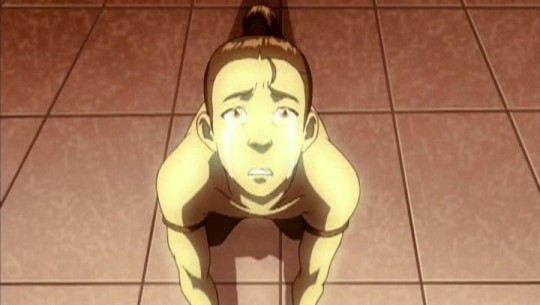
The Angi Kai isn't meant to be a showcase of Zuko's fighting potential (that's what the Zhao fight is for), but to show the utter cruelty of Ozai.
#THIS OMG#i agree#took the words out of my mouth#nana talks series#nanarambles#atla#atla live action#i also feel like the original cartoon series were targeted for kids/teens#and then the live action is for those kids who have grown into adults now#and that's why we see those changes
15K notes
·
View notes
Text
I was skeptical about the live action of ATLA but after giving it a watch to the end I really ended up liking it. As I am now rewatching the original series, I notice all the differences people were complaining talking about and I kinda understand how they adapted it? Like come on, a book adapted into a movie is gonna be different, so a cartoon series made into a live action is obviously gonna have differences too. I feel like the people who constantly shit on the live action are either haters for no reason or just jumping on the hate train.
#nanarambles#nana talks series#ATLA#atla live action#i saw this post about zuko fighting back ozai in the live action#which isnt like how he literally kneeled and begged to ozai in the series#i actually like that he fought back????#especially him having that COMPASSION IS WEAKNESS quote engraved his mind#and then ozai telling zuko to take the 41st division as his crew???#that was a TOUCHING moment omg#the only thing that still bothers me a little is the casting of azula and her gang#but what do i know#clearly i just end up enjoying stuff adhdsahdads#although in terms of live action adapted from series#one piece still holds first place
7 notes
·
View notes
Note
knock knock!
saw your masterlist and you are PERFECT for my jay fic cravings 🤭🤭
hi! so nice to hear that and thank you so much for stopping by 🥰💖❤
0 notes